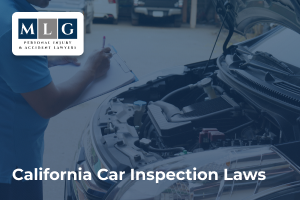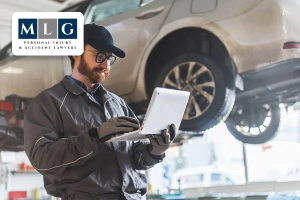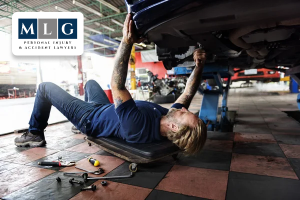
California's roads require vehicles to meet specific standards to ensure public safety and environmental protection. The state's rigorous car inspection laws focus on reducing pollution and maintaining road safety. These laws include regular smog checks, safety inspections, and verifying the vehicle's identification number (VIN). For Marcereau Law Group' clients, staying informed about these laws is crucial. This is about compliance and safeguarding client rights in case of accidents.
These laws apply to all types of vehicles, including diesel-powered vehicles and electric vehicles. If your car fails an emissions test or any other part of the inspection, you might not be allowed to drive that car on the roads. A vehicle that fails inspection requirements could be at a greater risk of suffering a car accident.
Learn more about California car inspection laws below. Then, contact us to schedule a free consultation.
California car inspection laws maintain high vehicle safety and environmental protection standards. These laws require vehicles to pass regular inspections that assess their emissions and safety features. The state mandates these checks to ensure that cars do not contribute excessively to air pollution and are safe to operate on public roads. Adherence to these laws is a legal requirement for all vehicle owners in the state.

California mandates various types of car inspections. They uphold vehicular and environmental safety standards. These inspections include smog checks, safety inspections, and VIN verifications. Each type of inspection serves a distinct purpose. Smog checks control pollution; safety inspections ensure a vehicle's roadworthiness, and VIN inspections verify a vehicle's identity. Regular compliance with these inspections is crucial for legal vehicle operation in California.
Smog checks are a critical component of California's vehicle inspection program. They focus on reducing air pollution. These inspections evaluate a vehicle's exhaust system to ensure it meets state emission standards. Most cars in California must undergo a smog check biennially for registration renewal. This inspection is crucial in California's efforts to maintain clean air. Regular inspections reduce environmental health risks.
Safety inspections in California assess a vehicle's operational safety features. These inspections check for any issues that could compromise a vehicle's safety. They include brake malfunctions or faulty lighting. Compliance with safety inspection requirements is crucial to prevent accidents. These inspections help ensure the safety of all road users.
VIN inspections in California verify the identity of a vehicle. These checks ensure that the VIN matches the vehicle's registration documents. This inspection is crucial in preventing vehicle theft and fraud. VIN inspections are typically required when a vehicle is registered for the first time in California. They are also mandated if there's a discrepancy in the vehicle's documentation.
California's smog inspection requirements are integral to the state's environmental protection efforts. These inspections ensure vehicles meet specific emission standards to reduce air pollution. Most vehicles must undergo a smog check at regular intervals, typically every two years. Adhering to these requirements is legally mandatory. It contributes significantly to the state's clean air initiative.
California sets stringent emission standards to control air pollution from vehicles. These standards are among the strictest in the United States. They are designed to reduce harmful emissions like carbon monoxide and nitrogen oxides. Vehicles must meet these standards to pass the smog check and be eligible for registration. Meeting these emission standards helps reduce air pollution.
California's emission standards include the on-board diagnostics (OBD) system. OBD systems monitor a vehicle's performance and alert drivers to potential emission-related issues. Vehicles equipped with OBD systems undergo specific checks during the smog inspection. Proper functioning of the OBD system is essential for a car to comply with California's emission regulations.
California employs standardized testing procedures and equipment for smog inspections. These procedures ensure that the testing is accurate. The equipment used is calibrated to detect a range of emissions accurately. Understanding these procedures can help vehicle owners prepare for smog checks.
Upon passing a smog check, a vehicle receives a compliance certificate. This document is required for vehicle registration renewal and must be submitted to the DMV. The smog inspection station also sends an electronic test results report to the DMV. Keeping this documentation is essential for proving compliance with state emission standards.

California's safety inspection requirements ensure vehicles operating are safe. Cars should not pose a risk to drivers or pedestrians. These inspections focus on critical safety components of the car. They include brakes, lights, and steering mechanisms. Compliance with these safety standards is a legal requirement. It is also a crucial factor in preventing accidents and ensuring road safety.
A vehicle's lighting and signaling equipment are essential for safe driving. This is particularly true during low visibility conditions. California's safety inspections check for the proper functioning of headlights, taillights, brake lights, and turn signals. These lights are vital for communication with other drivers. They can prevent accidents.
The brakes are one of the most critical safety features of any vehicle. California's safety inspections check the vehicle's braking system. They include the brake pads, rotors, and fluid levels. Proper brakes are crucial for road safety. They effectively reduce the risk of collisions. They must be maintained accordingly.
Tires and wheels play a significant role in vehicle safety and performance. During safety inspections in California, the condition of tires, including tread depth and pressure, is thoroughly evaluated. Properly maintained tires are crucial for safe driving, providing necessary traction and handling. Regular checks of tires and wheels can prevent accidents and ensure a smoother driving experience.
The steering and suspension systems are critical for the safe maneuvering of a vehicle. California's safety inspections assess these systems to ensure they are functioning correctly. Issues with steering and suspension can lead to loss of vehicle control, posing a significant risk on the road.
Mirrors and windshield wipers are essential for visibility and awareness on the road. During California's safety inspections, the condition and functionality of mirrors and wipers are checked. Properly functioning mirrors and wipers are essential for safe driving, providing clear visibility and awareness of surrounding traffic. Regular maintenance of these components is vital for road safety.
VIN verification is a cornerstone of inspections in California. This process ensures the VIN matches the vehicle's registration and title documents. VIN verification is crucial for preventing vehicle theft and fraud. It's typically required for cars being registered in California for the first time or when there's a change in ownership.
A. Authorized Inspection Centers
California has numerous authorized inspection centers across the state. These centers have the necessary tools and expertise to conduct vehicle inspections. Vehicle owners can visit these centers for smog checks, safety inspections, and VIN verifications. Choosing a reputable and authorized center ensures reliable and accurate inspection results.
B. Scheduling and Appointment Procedures
Scheduling an appointment for a vehicle inspection in California is straightforward. Vehicle owners can contact authorized inspection centers to schedule an appointment. Some centers may offer online booking options for added convenience. Timely scheduling helps avoid delays in vehicle registration or renewal.
C. Inspection Fees
Inspection fees in California vary depending on the type of inspection and the vehicle. Smog check fees typically range from $30 to $70, with safety inspections and VIN verifications having their own set fees. These fees cover the cost of the inspection and any necessary documentation. It's wise to confirm the prices in advance to prepare accordingly.
D. Consequences of Non-Compliance
Non-compliance with California's vehicle inspection laws can lead to significant consequences. This includes fines, registration suspension, and, in some cases, legal action. Regular inspections are crucial for preventing fines and sanctions.

A. Penalties for Non-Compliance
Non-compliance with California's vehicle inspection laws can lead to administrative penalties. Vehicle owners may face registration holds or suspensions, limiting their legal driving ability. In some cases, non-compliance can result in a vehicle being classified as non-operational.
B. Citations and Fines
Failing to comply with inspection laws often results in citations and fines. Repeated offenses can lead to progressively higher fines. Vehicle owners must adhere to inspection schedules to avoid these financial penalties.
C. Implications for Vehicle Registration
Inspection violations can have direct implications for vehicle registration in California. The DMV may only renew a vehicle's registration once compliance is achieved. In severe cases, a vehicle's registration can be revoked. Timely inspections are critical to uninterrupted vehicle registration and use.
D. Legal Recourse for Vehicle Owners
Vehicle owners have the right to contest citations related to inspection violations. They can seek legal advice to understand their options and possible defenses. In cases of dispute over inspection results, owners can opt for re-inspection at a different authorized center. Legal support is often crucial in navigating these issues effectively.
Carrying automobile insurance is a legal requirement for all vehicle owners in California. This insurance must cover liability for personal injury and property damage. Failing to have valid insurance can lead to severe legal consequences. They include fines and registration suspension.
Maintaining the required insurance is vital for legal compliance and financial protection. They protect all parties in the event of a car or truck accident.

California's car inspection and insurance laws are designed to ensure public safety. These inspections are critical in environmental protection. If your vehicle fails an emissions inspection, it could be removed from the road.
At Marcereau Law Group, we are committed to helping you navigate these legal requirements. Call us today to schedule your free case consultation.
Schedule Your Free Consultation
"*" indicates required fields


"*" indicates required fields